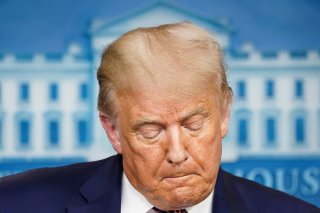The Case Against Trump
By the time Trump's term reaches its unhappy conclusion, he may well have overtaken Andrew Johnson as the most dangerous chief executive ever to occupy the Executive Mansion.
One of Trump’s first decisions upon taking office was to withdraw from the Trans-Pacific Partnership (TPP), a trading arrangement that would have bound much of East Asia ever more tightly to the United States. Instead, it is China that has negotiated agreements with many of the countries that were slated to join TPP. Even now, with China supposedly in Trump’s crosshairs as the cause of what he derisively calls the “Kung Flu,” at least insofar as it has enabled him to attack Joe Biden and the Democrats, he has studiously withheld criticism of Xi Jinping, whose untrammeled authority over China makes Putin pale by comparison. Whether or not John Bolton is accurate when he asserts that Trump has asked Xi for help in his reelection campaign, there is no denying that, whatever steps his administration might take against China, Trump’s own tweets have been noticeably silent on the subject of Uighur concentration camps or on the violation of Hong Kong’s autonomy.
Trump has long salivated over the prospect of winning a Nobel Peace Prize. He prides himself on his meetings with North Korea’s Kim Jong-un, although they have accomplished nothing material other than enabling Kim to portray himself as the equal of the American president. Pyongyang has intensified its rhetoric against the South and continues to threaten to resume its testing of delivery systems for its nuclear arsenal. Yet Trump has been noticeably reluctant to criticize Kim, whom he has called his “friend.”
Trump’s other great peace project is the Middle East; his son-in-law Jared Kushner has produced what Trump has called “the deal of the century.” The problem with the deal is that one of the parties, the Palestinians, will have none of it, while the other, Israel, proceeds toward annexation that threatens to undermine both Middle Eastern stability and its own long-term economic security.
OF ALL his shortcomings, perhaps the greatest, and for which the American people may punish him in the November elections, is his ham-fisted and incompetent mismanagement of the administration’s response to the COVID-19 crisis. In January, when the disease first made its appearance in the United States, Trump announced that “we have it totally under control. It’s one person coming in from China. We have it under control. It’s going to be just fine.” A month later, he insisted that, “We have it very much under control in this country.” In March, when asked about the emergence of the virus in the Washington, dc area, he replied, “No, I’m not concerned at all. No, we've done a great job with it.” In early April, with over 273,000 confirmed cases in the United States, Trump asserted, "I said it was going away—and it is going away." In May, he reiterated that “this is going to go away without a vaccine.” And in June, he further insisted that “this is going to go away without a vaccine.” He long defied medical insistence that all Americans wear masks. He insisted on speaking at rallies for which no social distancing is required. He continues to challenge the findings of America’s leading health professionals. In the meantime, the United States now leads the world in the number of coronavirus cases and has lost some 150,000 people to COVID-19 at the time of writing, leading the world in that category as well. Both numbers may be underestimates. With the death toll continuing to rise, the economy continuing to crater, and his electoral prospects continuing to fade, a terrified Trump has mused about postponing the election. Top Republicans, like their Democratic counterparts, have flatly rejected his panicked proposal.
In light of the foregoing, it may not be too much to assert that Donald Trump ranks among the worst presidents in American history. Perhaps, by the time his term reaches its unhappy conclusion, he may well have overtaken Andrew Johnson as undoubtedly the most dangerous chief executive ever to occupy the Executive Mansion.
Dov S. Zakheim served as the undersecretary of defense (comptroller) and chief financial officer for the U.S. Department of Defense from 2001–2004 and as the deputy undersecretary of defense (planning and resources) from 1985–1987. He also served as the DoD’s civilian coordinator for Afghan reconstruction from 2002–2004. He is vice chairman of the Center for the National Interest.

